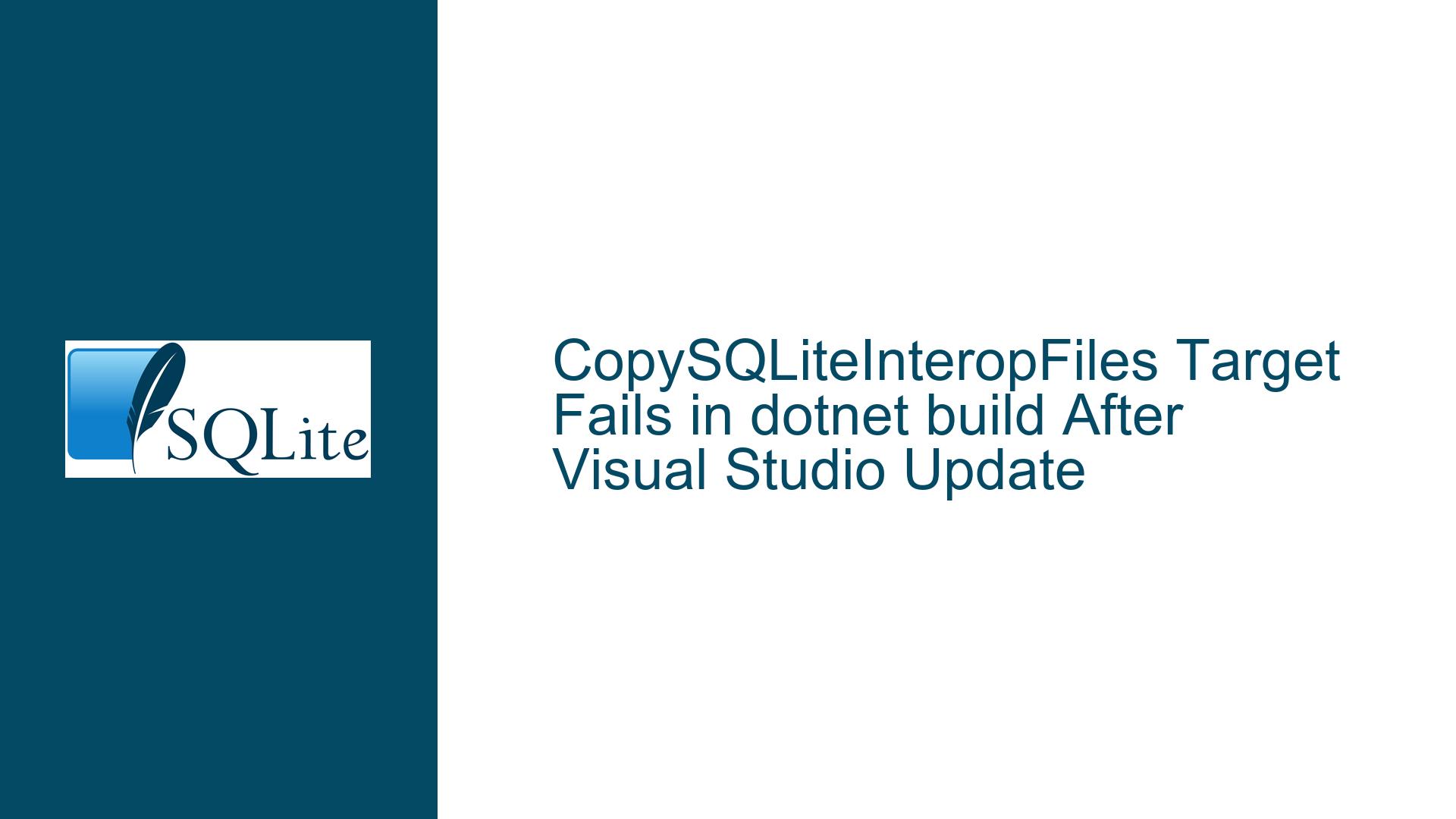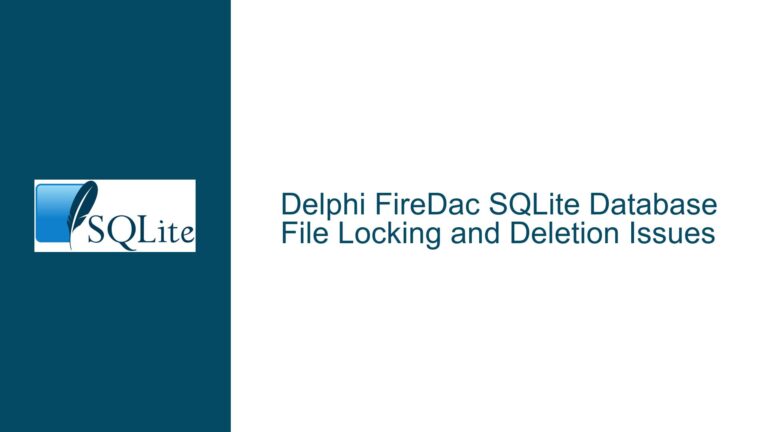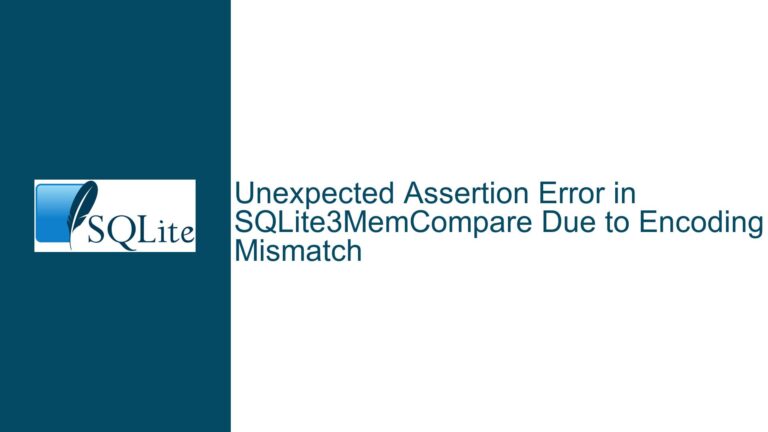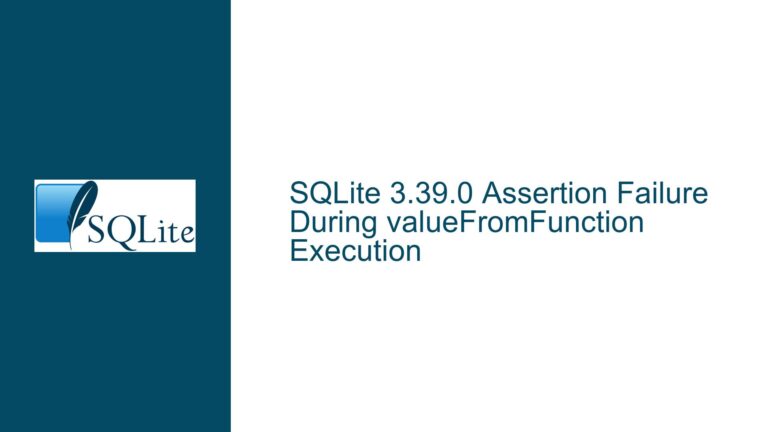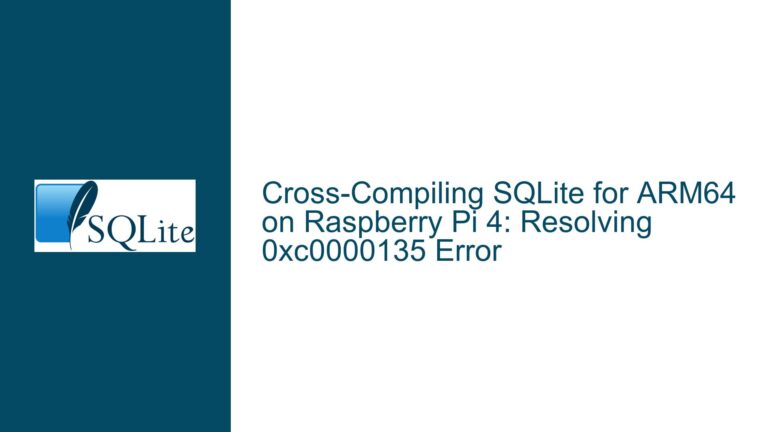CopySQLiteInteropFiles Target Fails in dotnet build After Visual Studio Update
CopySQLiteInteropFiles Target Skipped During Command-Line Builds
The core issue revolves around the CopySQLiteInteropFiles MSBuild target not executing during command-line builds using dotnet build, despite functioning correctly within Visual Studio after an update to version 16.10.2. The target is responsible for copying platform-specific SQLite.Interop.dll files to the build output directory, which is critical for resolving runtime errors related to missing SQLite native dependencies. When the target is skipped, applications may fail to locate these native binaries, leading to "DLL not found" exceptions or runtime crashes.
The problem manifests in verbose build logs with the message:
Skipping target "CopySQLiteInteropFiles" because it has no outputs.
Though the target has declared its outputs, the output specification only references empty properties and/or empty item lists.
This indicates that the MSBuild engine considers the target unnecessary due to a lack of declared outputs, even though the target’s logic is essential for SQLite interoperability. The discrepancy arises specifically in command-line builds, where the .NET SDK version (e.g., 16.10.1) may not align with the Visual Studio-integrated MSBuild version (16.10.2), leading to inconsistent target evaluation.
Mismatched Build Tool Versions and Target Script Configuration
.NET SDK and Visual Studio MSBuild Version Misalignment
Visual Studio 16.10.2 includes an updated MSBuild engine that resolves the CopySQLiteInteropFiles target evaluation issue. However, the standalone .NET CLI (dotnet build) may use an older SDK version (e.g., 16.10.1) that lacks this fix. The .NET SDK updates are not always synchronized with Visual Studio updates, creating version gaps.Incomplete or Cached NuGet Package Restoration
The Stub.System.Data.SQLite.Core.NetFramework.targets file, which defines the CopySQLiteInteropFiles target, is imported via the System.Data.SQLite.Core NuGet package. Ifdotnet restorefails to update this package or restore its targets correctly, the build process may reference stale or corrupted scripts, causing the target to misdeclare its outputs.Project Configuration Conflicts
The ContentSQLiteInteropFiles property controls whether the target executes. In some environments, this property might be overridden by default settings in the .NET SDK or conflicting MSBuild properties (e.g., EnableDefaultItems). Platform-specific build configurations (x86/x64) can also affect how the target resolves output paths for SQLite.Interop.dll.Target Script Logic Errors
The CopySQLiteInteropFiles target in the NuGet package’s .targets file may have conditional logic that assumes Visual Studio-specific environment variables (e.g., $(BuildingInsideVisualStudio)). Command-line builds might bypass these conditions, leading to empty output declarations.
Validating Build Environments, Forcing Target Execution, and Resolving Output Paths
Step 1: Verify .NET SDK and MSBuild Versions
Execute dotnet --version and compare the output with the Visual Studio-integrated MSBuild version (found in Help > About Visual Studio). If the versions differ:
- Download the latest .NET SDK from Microsoft’s .NET Downloads and install it separately.
- Set the MSBuildSDKsPath environment variable to force
dotnet buildto use the updated SDK:set MSBuildSDKsPath=C:\Program Files\dotnet\sdk\6.0.300\SdksReplace the path with your SDK installation directory.
Step 2: Force NuGet Package Reinstallation
Delete the packages.lock.json file (if present) and the obj/ directory in your project. Then run:
dotnet restore --force-evaluate
This ensures the latest version of System.Data.SQLite.Core and its targets are restored. Confirm that the Stub.System.Data.SQLite.Core.NetFramework.targets file exists in the NuGet cache:
~\.nuget\packages\stub.system.data.sqlite.core.netframework\1.0.114\buildTransitive\net46\
Step 3: Override ContentSQLiteInteropFiles in Command-Line Builds
Add an explicit
<PropertyGroup>
<ContentSQLiteInteropFiles>true</ContentSQLiteInteropFiles>
</PropertyGroup>
If using a multi-platform build, combine this with conditional platform declarations:
<PropertyGroup Condition="'$(Platform)' == 'x64'">
<SQLiteInteropDir>..\packages\stub.system.data.sqlite.core.netframework\1.0.114\runtimes\win-x64\native</SQLiteInteropDir>
</PropertyGroup>
Step 4: Manually Declare Target Outputs
Edit the imported .targets file (temporarily) or create a custom target to force output generation. For example, add this to your .csproj:
<Target Name="ForceCopySQLiteInteropFiles" AfterTargets="CopySQLiteInteropFiles">
<Message Importance="high" Text="Forcing SQLite.Interop.dll copy" />
<ItemGroup>
<SQLiteInteropFiles Include="$(SQLiteInteropDir)\SQLite.Interop.dll" />
</ItemGroup>
<Copy SourceFiles="@(SQLiteInteropFiles)" DestinationFolder="$(OutputPath)" />
</Target>
Step 5: Use MSBuild Instead of dotnet build
Invoke the build using msbuild.exe directly, ensuring it uses the updated Visual Studio instance:
"C:\Program Files\Microsoft Visual Studio\2022\Community\MSBuild\Current\Bin\msbuild.exe" /p:Configuration=Release /p:Platform=x64
This bypasses the .NET SDK’s versioning issues.
Step 6: Diagnose Target Evaluation with Binary Logs
Generate a detailed build log using:
dotnet build /bl
Open the resulting msbuild.binlog with the MSBuild Binary and Structured Log Viewer. Inspect the CopySQLiteInteropFiles target’s inputs and outputs. Look for missing items in the @(SQLiteInteropFiles) collection or unresolved $(SQLiteInteropDir) properties.
Step 7: Update the NuGet Package to a Fixed Version
Check if newer versions of System.Data.SQLite.Core address the target execution logic. For example, version 1.0.115 or later might include corrected output declarations:
<PackageReference Include="System.Data.SQLite.Core" Version="1.0.115" />
Step 8: Customize Output Paths for Platform-Specific Builds
Explicitly define output directories for SQLite.Interop.dll in your project file:
<ItemGroup Condition="'$(Platform)' == 'x64'">
<None Include="$(SQLiteInteropDir)\SQLite.Interop.dll">
<Link>SQLite.Interop.dll</Link>
<CopyToOutputDirectory>PreserveNewest</CopyToOutputDirectory>
</None>
</ItemGroup>
This bypasses the CopySQLiteInteropFiles target entirely.
Step 9: Patch the .targets File
Locate Stub.System.Data.SQLite.Core.NetFramework.targets in your NuGet cache and modify the CopySQLiteInteropFiles target’s output declarations. For example, replace:
<Outputs="@(SQLiteInteropFiles->'%(FullPath)')"
with an explicit output file:
<Outputs="$(OutputPath)\SQLite.Interop.dll"
Note: This is a temporary workaround and should be reapplied after each dotnet restore.
Step 10: Report the Issue to Microsoft and SQLite Maintainers
File a bug report with:
- Microsoft Developer Community for .NET SDK version mismatches.
- SQLite NuGet Package Repository for target script improvements.
By systematically addressing version mismatches, target script logic, and build configuration conflicts, the CopySQLiteInteropFiles target can be coerced into executing reliably across both Visual Studio and command-line environments.
